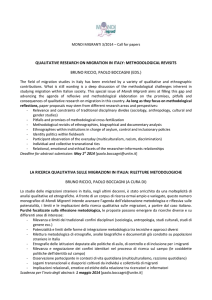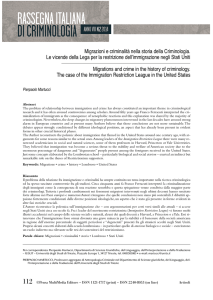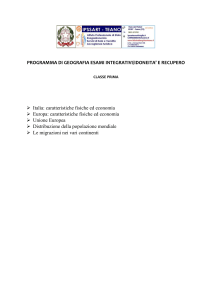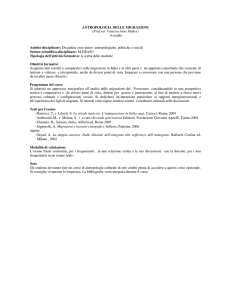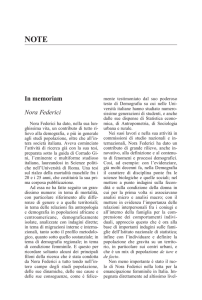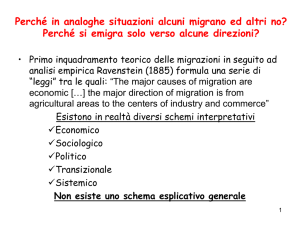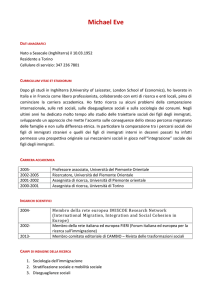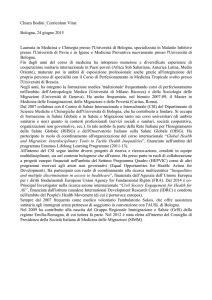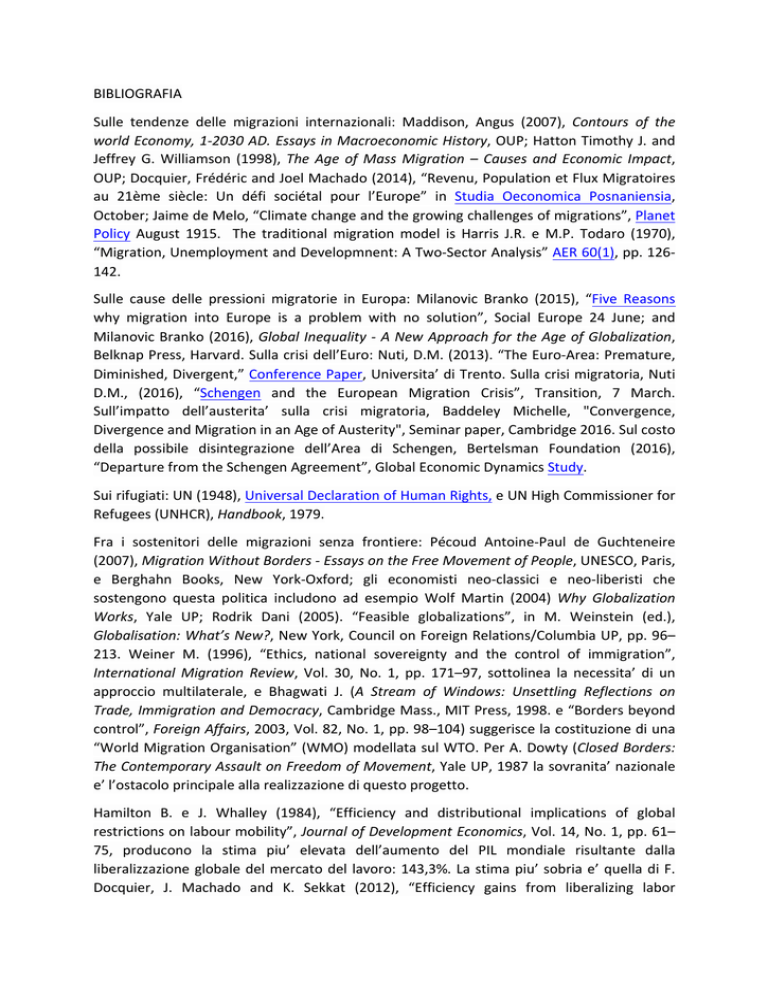
BIBLIOGRAFIA Sulle tendenze delle migrazioni internazionali: Maddison, Angus (2007), Contours of the world Economy, 1-­‐2030 AD. Essays in Macroeconomic History, OUP; Hatton Timothy J. and Jeffrey G. Williamson (1998), The Age of Mass Migration – Causes and Economic Impact, OUP; Docquier, Frédéric and Joel Machado (2014), “Revenu, Population et Flux Migratoires au 21ème siècle: Un défi sociétal pour l’Europe” in Studia Oeconomica Posnaniensia, October; Jaime de Melo, “Climate change and the growing challenges of migrations”, Planet Policy August 1915. The traditional migration model is Harris J.R. e M.P. Todaro (1970), “Migration, Unemployment and Developmnent: A Two-­‐Sector Analysis” AER 60(1), pp. 126-­‐
142. Sulle cause delle pressioni migratorie in Europa: Milanovic Branko (2015), “Five Reasons why migration into Europe is a problem with no solution”, Social Europe 24 June; and Milanovic Branko (2016), Global Inequality -­‐ A New Approach for the Age of Globalization, Belknap Press, Harvard. Sulla crisi dell’Euro: Nuti, D.M. (2013). “The Euro-­‐Area: Premature, Diminished, Divergent,” Conference Paper, Universita’ di Trento. Sulla crisi migratoria, Nuti D.M., (2016), “Schengen and the European Migration Crisis”, Transition, 7 March. Sull’impatto dell’austerita’ sulla crisi migratoria, Baddeley Michelle, "Convergence, Divergence and Migration in an Age of Austerity", Seminar paper, Cambridge 2016. Sul costo della possibile disintegrazione dell’Area di Schengen, Bertelsman Foundation (2016), “Departure from the Schengen Agreement”, Global Economic Dynamics Study. Sui rifugiati: UN (1948), Universal Declaration of Human Rights, e UN High Commissioner for Refugees (UNHCR), Handbook, 1979. Fra i sostenitori delle migrazioni senza frontiere: Pécoud Antoine-­‐Paul de Guchteneire (2007), Migration Without Borders -­‐ Essays on the Free Movement of People, UNESCO, Paris, e Berghahn Books, New York-­‐Oxford; gli economisti neo-­‐classici e neo-­‐liberisti che sostengono questa politica includono ad esempio Wolf Martin (2004) Why Globalization Works, Yale UP; Rodrik Dani (2005). “Feasible globalizations”, in M. Weinstein (ed.), Globalisation: What’s New?, New York, Council on Foreign Relations/Columbia UP, pp. 96–
213. Weiner M. (1996), “Ethics, national sovereignty and the control of immigration”, International Migration Review, Vol. 30, No. 1, pp. 171–97, sottolinea la necessita’ di un approccio multilaterale, e Bhagwati J. (A Stream of Windows: Unsettling Reflections on Trade, Immigration and Democracy, Cambridge Mass., MIT Press, 1998. e “Borders beyond control”, Foreign Affairs, 2003, Vol. 82, No. 1, pp. 98–104) suggerisce la costituzione di una “World Migration Organisation” (WMO) modellata sul WTO. Per A. Dowty (Closed Borders: The Contemporary Assault on Freedom of Movement, Yale UP, 1987 la sovranita’ nazionale e’ l’ostacolo principale alla realizzazione di questo progetto. Hamilton B. e J. Whalley (1984), “Efficiency and distributional implications of global restrictions on labour mobility”, Journal of Development Economics, Vol. 14, No. 1, pp. 61–
75, producono la stima piu’ elevata dell’aumento del PIL mondiale risultante dalla liberalizzazione globale del mercato del lavoro: 143,3%. La stima piu’ sobria e’ quella di F. Docquier, J. Machado and K. Sekkat (2012), “Efficiency gains from liberalizing labor mobility”, Discussion Paper 23 IRES Louvain and UCL, che la stimano fra il 7,0% e il 17,9% del PIL mondiale. Per un’opinione contraria: Chilosi Alberto, (2002) On the Economics and Politics of Unrestricted Immigration, The Political Quarterly, pp. 431-­‐435. Sulle conseguenze delle migrazioni sul paese di origine: Collier Paul (2013), Exodus: Immigration and Multiculturalism in the 21st Century, OUP (in particolare il “brain drain”, ma le migrazioni possono incoraggiare investimento in capitale umano, vedi Docquier, F. & H. Rapoport (2012), “Globalization, brain drain and development”, Journal of Economic Literature 50 (3): 681-­‐730. Sulle conseguenze economiche delle migrazioni: Milanovic Branko (2015) Migration: Positives and Negatives, Social Europe, e il suo Global Inequality -­‐ A New Approach for the Age of Globalization, Belknap Press, Harvard, 2016. Sui costi e benefici della globalizzazione, solitamente esagerati: Nuti D.M. (2006) “Efficienza e Distribuzione nell’Economia Globale”, Lezioni Federico Caffè, Universita’ di Roma La Sapienza. Sulle modeste ripercussioni delle migrazioni su occupazione e salari dei paesi di arrivo: Faini, R., J. De Melo and K. F. Zimmermann (1999), “Trade and migration: an introduction”, in R. Faini, J. De Melo and K. F. Zimmermann (eds), Migration: The Controversies and the Evidence. CUP, pp. 1–20; Nickell, S., and Saleheen, J. (2008), “The Impact of Immigration on Occupational Wages: Evidence from Britain”, Federal Reserve Bank of Boston, Working Paper No. 08-­‐6. Per stime di effetti negativi maggiori: Angrist, J. D. and Kugler, A. D. (2003), “Productive or counterproductive? Labour market institutions and the effect of immigration on EU natives, Economic Journal, vol. 113, pp. 302–37; Sébastien Jean, Miguel Jimenez (2011), “The unemployment impact of immigration in OECD countries”, European Journal of Political Economy, vol. 27(2), p.241-­‐256; per gli USA, Borjas, G. (2013), “The Analytics of the Wage Effect of Immigration”, IZA Journal of Migration 2:22; Albrecht Glitz (2012): The Labor Market Impact of Immigration: A Quasi-­‐Experiment Exploiting Immigrant Location Rules in Germany, Journal of Labor Economics, Vol. 30 (1), pp. 175-­‐213. Sugli effetti fiscali delle migrazioni: Dustmann, C., and Frattini, T. (2013), ‘The Fiscal Effects of Immigration to the UK’, Discussion Paper Series No. 22/13, Centre for Research and Analysis of Migration (CReAM), Louvain, and University College London. Rowthorn R. E. (2015), The costs and benefits of large scale immigration -­‐ Exploring the economic and demographic consequences for the UK, Civitas, London/ Sui possibili rimedi alla crisi migratoria presente: Milanovic June 2015, cit.; Rodrik, D, (2011), The Globalization Paradox, Oxford UP; Rowthorn R. E. (2016), “On the European Migration Crisis”, Transition, 6 April; Soros George (2016) “Bringing Europe’s Migration Crisis Under Control”, Social Europe, 12 April. Per aggiornamenti recenti: Metsola Roberta, Kashetu Kyenge (2016), “Proposta di Risoluzione del Parlamento Europeo ...in materia di immigrazione”, Bruxelles; Matteo Garavoglia, “Securing Europe's borders: The first step to a comprehensive asylum policy,” Brookings, 2 May 2016, contenente anche molti links a documenti ufficiali; Di Pasquale Enrico, Andrea Stuppini e Chiara Tronchin (2016), “Quelle divergenze da correggere sui profughi”, La Voce 10 maggio, in particolare sulla lentezza delle procedure italiane di asilo e le differenze delle attuali 20 Commissioni per l’esame delle domande di asilo, fra di loro e rispetto alla media di altri paesi europei.

